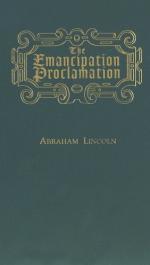|
This section contains 742 words (approx. 3 pages at 300 words per page) |

|
President Abraham Lincoln's preliminary Emancipation Proclamation of September 22, 1862, became federal military policy on January 1, 1863, prompting Secretary of the Navy Gideon Welles to describe it as "a broad step … a landmark in history" (Welles, vol. 1, p. 212). The edict transformed the Civil War into a war of African-American liberation. On New Year's Day, "all persons held as slaves within any State … then … in rebellion against the United States" became "thenceforward, and forever free" (Basler, vol. 5, p. 434). Although in 1861 Lincoln had repeatedly asserted that his responsibility as president was to suppress the South's rebellion and reunite the nation, not to free its slaves, by late 1862 the realities of war forced him to incorporate emancipation into national policy. Emancipation was both a military tactic and a humanitarian act.
At this point in the war, the armies stood locked in a stalemate and Northern morale was low. England was threatening to...
|
This section contains 742 words (approx. 3 pages at 300 words per page) |

|


